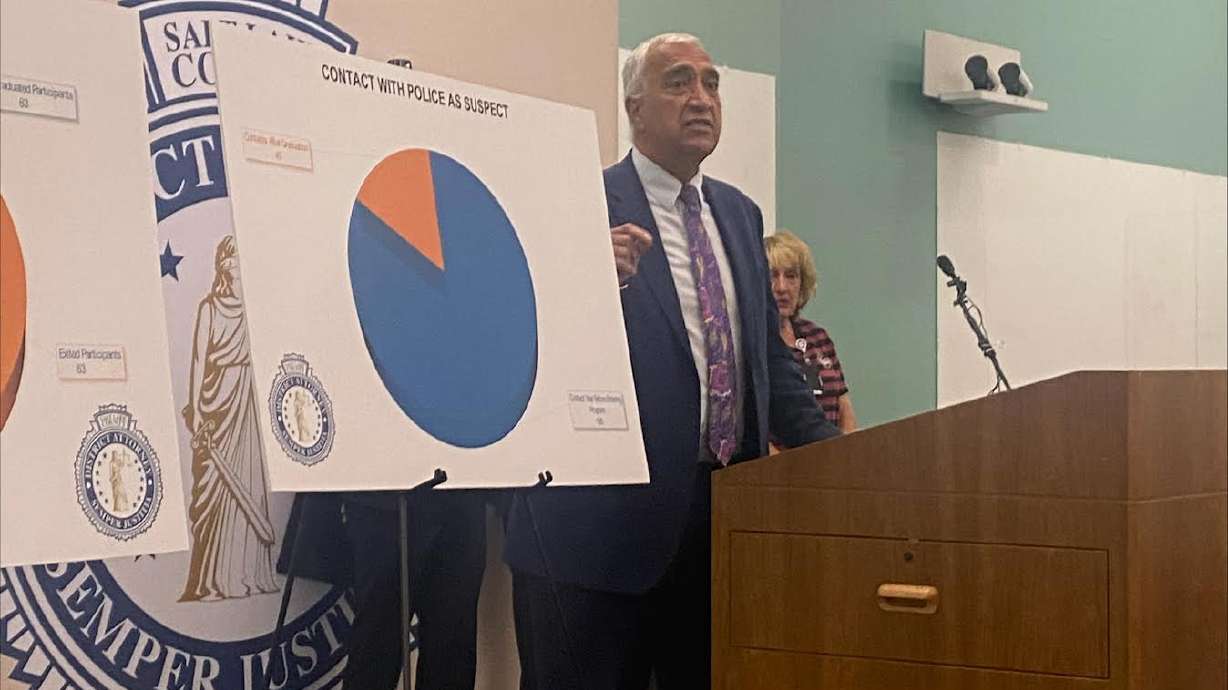Estimated read time: 4-5 minutes
This archived news story is available only for your personal, non-commercial use. Information in the story may be outdated or superseded by additional information. Reading or replaying the story in its archived form does not constitute a republication of the story.
SALT LAKE CITY — Prosecutors and defense attorneys agree this group is one of the most difficult segments of the population to work with — those who consistently commit low-level misdemeanor offenses who are also homeless and suffering from either mental health issues or drug addiction or both.
When a home or business owner calls 911 to deal with someone in that situation, it takes up the time and resources of police and the city. But their offenses, such as criminal mischief or trespassing, often result in little jail time and little is ever done to correct that person's behavior, no matter how many times they commit the same offense.
That's why about a year ago, Salt Lake County District Attorney Sim Gill introduced a pilot program called the Familiar Faces Court. On Monday, Gill and Paige Williamson with the Salt Lake City Prosecutor's Office, Chris Manberg with Salt Lake Legal Defenders, and Kim Russo, a volunteer case manager, announced the initial results of that program.
"For the most part it's been a success," Manberg said.
The Familiar Faces Court is for people who commit nonviolent, misdemeanor crimes that would typically be handled in Salt Lake City Justice Court, and who are frequently coming in contact with police. In some cases, because of a person's mental disability, Gill says he can't even prosecute that person or have them go through the criminal justice system. But those people still tie up resources whenever police are called.
"This is the tail that wags the criminal justice dog," Gill said.
What the Familiar Faces Court aims to do is address the root cause of these low-level crimes by connecting people with the resources they need, whether it's for mental health or drug addiction. People who are accepted into the program will have their criminal cases paused and meet once a week with the same judge who will assign them tasks to perform. Some of those tasks may include signing up for Medicaid, drug treatment or Social Security or learning how to take the first steps to find transitional housing and putting them on the path to becoming self-reliant.
"An example of an average participant would be someone with 10 cases who would be expected to appear weekly in Familiar Faces; as he completes assignments cases are dismissed. If he gets a driver's license, a case is dismissed; if he applied for housing, another case is dismissed; if he gets Medicaid and (food stamps), another case is dismissed. If he does cognitive behavioral therapy, another case is dismissed. If he attends peer support groups, another case is dismissed. If he goes through a housing orientation interview, another case is dismissed; if he attends or continues substance abuse treatment, another case is dismissed," Gill said as examples of someone working toward graduation.
"I'm not going to lie, it's my most difficult day of the week," Williamson said. "But it's also the most rewarding."
The primary goal is the wellness of the human being.
– Kim Russo, volunteer case manager
"A lot of these clients that I represent and participate in the program are some of the most difficult people to access, to engage with in the community. They don't want any involvement in the criminal legal system, so as a result they don't show up to court," Manberg added.
But with the Familiar Faces Court, he said people are actually showing up on a weekly basis and learning how to do things that they were never taught. The key, he said, is they become familiar with the judge and prosecutor and trust is established.
The program has been offered to 122 people, 67 of whom agreed to participate rather than proceed in traditional court with their criminal charges. Of the 67 people who have participated since last November, 27 have graduated and seven have been removed for various violations.
Twenty-six of the 27 graduates had 63 cases in justice court and a combined total of 801 arrests, Gill said. Thirty of the people currently in the program account for 210 active criminal cases in justice court. Those 26 graduates had 195 contacts with police the year before graduating the program. Since graduating, police have had contact with them 40 times, with 12 of those graduates having zero contact with police.
One graduate collected a total of 186 misdemeanor charges prior to being in the program. Since graduating, he's only had contact with police twice, Gill said.
Even though police are still being called to deal with some people, Gill said it is happening less frequently.
"The threat of jail is sometimes we think the right incentive. But for this population, for many of them, jail means nothing," he said. "But if you treat people with a little bit of respect and dignity … the majority of people want access to those services, they've just never known how (to make it) happen.
"Our premise is very simple. This population which cannot actually be sustained in the criminal justice system or jail, even processed through it, can nonetheless be impacted and benefited in a way that we can slow down the contact with the criminal justice system," he continued. "We have years and years of data of doing the same thing and getting nothing out of it."
Gill said the pilot program is yielding a higher return on investment without compromising public safety.
"The primary goal is the wellness of the human being," added Russo.









